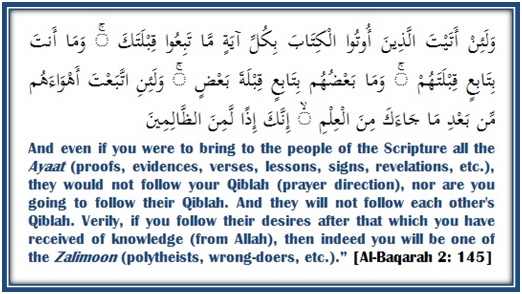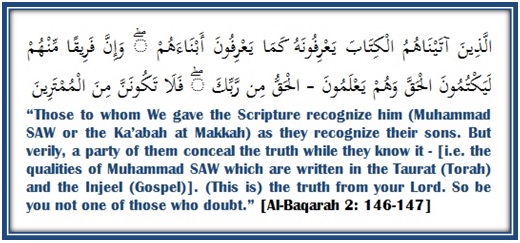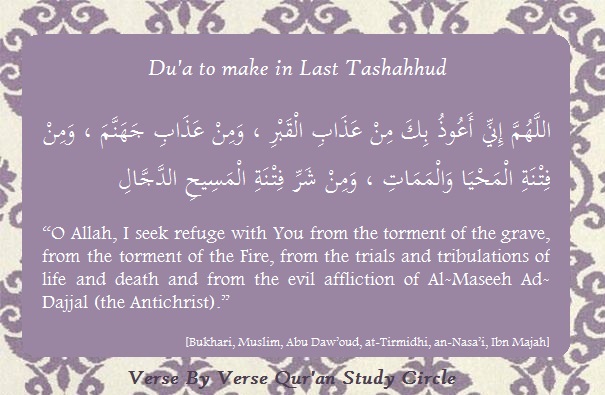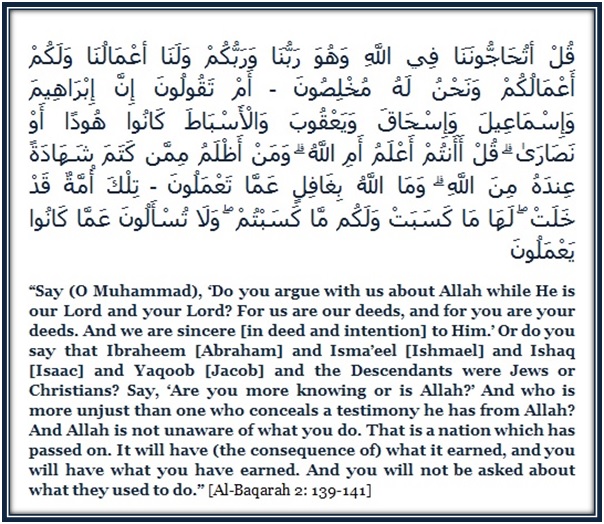In this ayah, Allah subhanahu wa ta’ala tells us why the change of Qiblah was instructed.
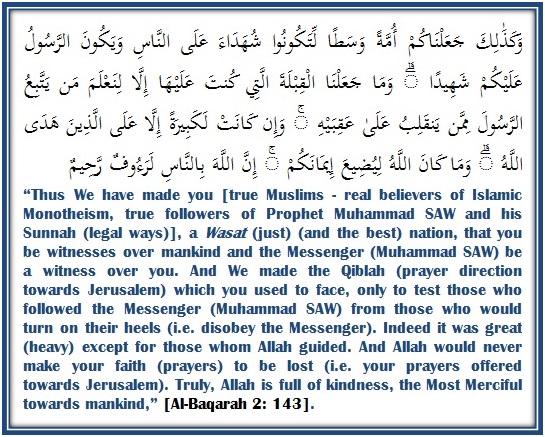 |
| Surah Baqarah Verse 143 |
Allah subhanahu wa ta’ala tells us that He changed our Qiblah to the Qiblah of Ibraheem ‘alayhi salaam so that He makes us the best nation ever. Hence, we will be the witnesses over the nations on the Day of Resurrection, for all of them will then agree concerning our virtue. The word Wasat in the ayah means ‘the best and the most honored’. It also means ‘middle’ such as the ‘Asr prayer is called Salat Al-Wusta (or the middle prayer). By making this Ummah the Wasat Allah subhanahu wa ta’ala endowed her with the most complete legislation, the best Manhaj [way, method, etc.] and the clearest Madhhab [methodology, mannerism, etc.].
This has also been mentioned in the Qur’an, Allah subhanahu wa ta’ala says,
هُوَ اجْتَبَـكُمْ وَمَا جَعَلَ عَلَيْكمْ فِى الدِّينِ مِنْ حَرَجٍ مِّلَّةَ أَبِيكُمْ إِبْرَهِيمَ هُوَ سَمَّـكُمُ الْمُسْلِمِينَ مِن قَبْلُ وَفِى هَـذَا لِيَكُونَ الرَّسُولُ شَهِيداً عَلَيْكُمْ وَتَكُونُواْ شُهَدَآءَ عَلَى النَّاسِ
“He has chosen you (to convey His Message of Islamic Monotheism to mankind), and has not laid upon you in religion any hardship: it is the religion of your father Ibraheem. It is He (Allah) Who has named you Muslims both before and in this (the Qur’an), that the Messenger may be a witness over you and you be witnesses over mankind!” [Al-Hajj 22: 78]
If we see on the map, the Ka’abah is geographically the center of this world. It is the place of guidance for the mankind as has been stated in Surah Aal-Imran ayah 96. This points to the fact that the Muslims (i.e. the new chosen nation) will be the source of guidance for all other mankind.
Previously, the messengers and prophets were sent to guide people and call them to the Oneness of Allah subhanahu wa ta’ala. After Muhammad salAllahu ‘alayhi wa sallam was sent as the Last Messenger, the Prophethood came to an end. No new prophet will come after him; therefore, it is the responsibility of the Muslim Ummah to rise and warn others. It is the legacy of the prophets that we have to carry forward.
It is a great favor of Allah subhanahu wa ta’ala that He chose Islam for us. He chose us to be the best and the most honored. He assigned us a responsibility and if we do everything in our life, get educated, get married, get jobs, have children and so on, but do not fulfill one main responsibility that Allah subhanahu wa ta’ala assigned us then what are we doing on this earth?
We say we have our jobs to attend to, our families to look after, children to raise and miscellaneous chores to perform, we don’t have time for da’wah. We want Allah subhanahu wa ta’ala to keep bestowing, but we won’t perform the one main task for which we were chosen. Does that make any sense?
Why were we chosen as the best nation? It was because when the Children of Israel – the previous chosen nation – failed to honor their responsibility and indulged in unnecessary activities the title was snatched from them. Today, we are busy in raising our families and chasing the worldly charms. The profiteers are busy alluring the general public by building fancier malls and monuments. The countries are competing in building skyscrapers and high-rise buildings. Many people are suffering either due to atrocities or due to being lost. And we have turned a blind eye to our one main responsibility? Then, what do we expect from Allah subhanahu wa ta’ala? Why do we ask Him to be Kind and Generous with us?
In the Bible, Haggai Chapter 1 verses 1-10, it appears:
In the second year of King Darius, on the first day of the sixth month, the word of the Lord came through the prophet Haggai to Zerubbabel son of Shealtiel, governor of Judah, and to Joshua son of Jozadaka the high priest:
This is what the Lord Almighty says: “These people say, ‘The time has not yet come to rebuild the Lord’s house.’”
Then the word of the Lord came through the prophet Haggai: “Is it a time for you yourselves to be living in your paneled houses, while this house remains a ruin?”
Now this is what the Lord Almighty says: “Give careful thought to your ways. You have planted much, but harvested little. You eat, but never have enough. You drink, but never have your fill. You put on clothes, but are not warm. You earn wages, only to put them in a purse with holes in it.”
This is what the Lord Almighty says: “Give careful thought to your ways. Go up into the mountains and bring down timber and build my house, so that I may take pleasure in it and be honored,” says the Lord. “You expected much, but see, it turned out to be little. What you brought home, I blew away. Why?” declares the Lord Almighty. “Because of my house, which remains a ruin, while each of you is busy with your own house. Therefore, because of you the heavens have withheld their dew and the earth its crops.
Often, we complain about lack of barakah (blessing) in our provision; we complain about lack of rains or rain that brings benefit to the earth and not destruction, we pray for peace and honor, but have we wondered why Allah subhanahu wa ta’ala is not answering our prayers? Does your father continue to give you pocket money, if you don’t listen to him? Do spouses continue being kind and nice to one another, if they don’t honor their responsibilities? Does your employer continue paying you salary whether you show up at work or not?
If we do not perform our duty, we taste the displeasure of Allah subhanahu wa ta’ala in this world, and we will be held accountable in the Hereafter, as well. Everybody is busy in his life and has many excuses for not striving in the way of Allah subhanahu wa ta’ala. Some make the excuse of lack of time; others make the excuse of lack of skills. If you don’t have the time, then organize it. Check your time wasters. If you find yourself not capable enough then learn the religion and acquire the required skills. Each one of us should think and plan, how we can work in the cause of Allah subhanahu wa ta’ala.
In the prayer, we ask Allah subhanahu wa ta’ala to guide us to the Straight Path. The path of those that He has favored and not of those that angered Him or those that lost their way. The moment we say tasleem we forget what we have prayed for and go on following the path of those that angered Him and those that went astray.
We cannot be favored if we do not follow the path of the prophets and their Companions. When a person owns his responsibility, such as learning and teaching the Qur’an, then his entire life changes. He is no more selfish, he thinks about the entire world. He yearns to help people come out of their sweet slumber and get connected to Allah subhanahu wa ta’ala.
Today, we have many engineers, doctors and so-called talented people among us, but do we have respect and dignity in this world? Wherever you look the Muslim is being oppressed or mocked. Because, we placed the Book of Allah behind our backs (we do not give it the importance that it deserves), Allah subhanahu wa ta’ala too has left us to be humiliated and oppressed by others.
We say: Others are not giving us our rights. Are we giving the Book of Allah, its rights? Are we giving other people their rights? Taking the message of the Qur’an to them is a right that they have and we are not honoring it. We say: They are mistreating us because of misunderstandings. They don’t know who we are or what we do. Have we taken the Message to them? How are we eradicating this misunderstanding?
The solution that some of us have identified is: assimilation. They said: If you change the way you dress up, the way you look, the way you talk, and the way you pray the misunderstanding will be removed. Does changing your skin color, your hair color, your dressing, the food that you eat, what you consider halal and haram, make you one of them?
Some chose assimilation as the solution while others chose isolation. Has that solved the issues? Do they accept us now? What about the responsibility that Allah subhanahu wa ta’ala assigned us?
We have exerted ourselves in chasing the world, it’s time to rise up and warn ourselves and others, as it was said in Surah Al-Mudaththir.
In the ayah, Allah subhanahu wa ta’ala tells us, “…you be witnesses over mankind and the Messenger be a witness over you.” A similar ayah appears in Surah An-Nisa (4:41), when ‘Abdullah ibn Mas’oud radhiAllahu ‘anhu recited the ayah the Prophet salAllahu ‘alayhi wa sallam cried profusely.
Imam Ahmad reported that Abu Sa’eed radhiAllahu ‘anhu narrated: Allah’s Messenger salAllahu ‘alayhi wa sallam said:
“Nuh will be called on the Day of Resurrection and will be asked, ‘Have you conveyed (the Message)?’ He will say, ‘Yes.’ His people will be summoned and asked, ‘Has Nuh conveyed (the Message) to you?’ They will say, ‘No warner came to us and no one (Prophet) was sent to us.’ Nuh will be asked, ‘Who testifies for you?’ He will say, ‘Muhammad and his Ummah.’
This is why Allah subhanahu wa ta’ala said:
وَكَذَلِكَ جَعَلْنَـكُمْ أُمَّةً وَسَطًا
“‘Thus We have made you a Wasat nation.’”
The Prophet said: The Wasat means ‘Adl [just]. You will be summoned to testify that Nuh has conveyed (his Message), and I will attest to your testimony. [It was also recorded by Al-Bukhari, At-Tirmidhi, An-Nasa’i and Ibn Majah.]
Then Allah subhanahu wa ta’ala says, “…And We made the Qiblah which you used to face, only to test those who followed the Messenger from those who would turn on their heels…” It means that Allah subhanahu wa ta’ala legislated the facing of Bayt Al-Maqdis at first and then changed it to the Ka’abah so as to find who will follow and obey Muhammad salAllahu ‘alayhi wa sallam and face whatever he faced and who “…turn on their heels…” meaning revert from Prophet’s religion.
LESSON:
Claiming to love the Prophet salAllahu ‘alayhi wa sallam and associating ourselves to him, and then not obeying or following him is hypocrisy. We have to leave what we love, what our forefathers did, what our people love, and follow only that which the Messenger salAllahu ‘alayhi wa sallam taught us.
Allah subhanahu wa ta’ala acknowledges that: “Indeed it was great (heavy) except for those whom Allah guided,” meaning while it was a test He knew those who are guided and are honest in their intention of following the Messenger salAllahu ‘alayhi wa sallam, they will honor the command and submit. They are those that believe in the truth of the Messenger salAllahu ‘alayhi wa sallam with certainty and whatever he was sent with without any doubts in their hearts. It is they who believe that Allah subhanahu wa ta’ala does what He wills, decides what He wills, commands His servants what He wills, abrogates any of His commands that He wills, and that He has the perfect wisdom and the unequivocal proof in all this. The attitude of the believers in this respect is unlike those who have a disease in their hearts, to whom whenever a matter occurs, it causes doubts, just as this same matter adds faith and certainty to the believers. In Surah Al-Isra ayah 17 Allah subhanahu wa ta’ala said,
وَنُنَزِّلُ مِنَ الْقُرْءَانِ مَا هُوَ شِفَآءٌ وَرَحْمَةٌ لِّلْمُؤْمِنِينَ وَلاَ يَزِيدُ الظَّـلِمِينَ إَلاَّ خَسَارًا
“And We send down of the Qur’an that which is a healing and a mercy to those who believe, and it increases the wrongdoers in nothing but loss,” (17:82).
Certainly, those who remained faithful to the Messenger salAllahu ‘alayhi wa sallam, obeyed him and faced whatever Allah subhanahu wa ta’ala commanded them, without doubt or hesitation, were the leaders of the Companions. Some scholars stated that the Early Migrants (who migrated with the Prophet from Makkah to Madina) and Ansar (the residents of Madinah who gave aid and refuge to both the Prophet and the Migrants) were those who offered prayers towards the two Qiblah (Bayt Al-Maqdis and then the Ka`bah).
LESSON:
If there is a command or a Sunnah that we are unable to submit to then we must check our heart. We must take ourselves into account and determine what’s stopping us from following it. Not being able to submit shows there is a flaw in our intention to follow the Messenger salAllahu ‘alayhi wa sallam. We are not being honest in our claim that we love him and we are his Ummah.
The next issue was about the Muslims who had passed away before the coming of this command. The Companions asked if their prayers have been wasted. Allah subhanahu wa ta’ala responds, “Allah would never make your faith (prayers) to be lost,” meaning, the reward of your prayers towards Bayt Al-Maqdis before would not be lost with Allah. Ibn Ishaq reported that Ibn `Abbas radhiAllahu ‘anhu narrated that this entails: Your (prayer towards) the first Qiblah and your believing your prophet and obeying him by facing the second Qiblah; He will grant you the rewards for all these acts.
إِنَّ اللَّهَ بِالنَّاسِ لَرَءُوفٌ رَّحِيمٌ
“Truly, Allah is full of kindness, the Most Merciful towards mankind.”
It is reported in the Saheeh that Allah’s Messenger salAllahu ‘alayhi wa sallam saw a woman among the captives who was separated from her child. Whenever she found a boy (infant) among the captives, she would hold him close to her chest, as she was looking for her boy. When she found her child, she embraced him and gave him her breast to nurse. Allah’s Messenger said:
أَتُرَوْنَ هذِهِ طَارِحَةً وَلَدَهَا فِي النَّارِ وَهِي تَقْدِرُ عَلى أَنْ لَا تَطْرَحَه
“Do you think that this woman would willingly throw her son in the fire?” The Companions responded: “No.” The Prophet salAllahu ‘alayhi wa sallam said,
فَوَاللهِ للهُ أَرْحَمُ بِعِبَادِهِ مِنْ هذِهِ بِوَلَدِهَا
“By Allah! Allah is more merciful with His servants than this woman with her son.”
If Allah subhanahu wa ta’ala is so Kind with us then we must certainly ask ourselves what are we doing with His Book and the ‘duty’ that He assigned us? All of us must play our part in spreading the Message of Allah subhanahu wa ta’ala through our conduct as well as through proper ‘taleem’ [teaching others].
We ask Allah subhanahu wa ta’ala for His Mercy and guidance.




